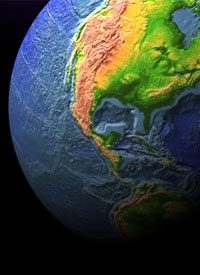
The site of Trinity’s plant was once home to an appliances plant owned and operated by Maytag Corporation, which closed in 2007, resulting in the loss of hundreds of jobs.
Observers have noted that president has reason to regard Iowa with nostalgic fondness, since his victory in the first-in-the-nation Iowa caucus nominating contest in January 2008, over Hillary Clinton, then his Democratic rival, provided him with the momentum that carried him to the Democratic presidential nomination and eventually to the White House.
Two Obama administration cabinet members, Energy Secretary Steven Chu and Labor Secretary Hilda Solis, published an Earth Day op-ed piece published in six regional newspapers — the Austin American-Statesman, Buffalo News, Denver Post, Montgomery Advertiser, Omaha World Herald, and Pittsburgh Post-Gazette. The article noted, in part:
On April 22nd, people across the country and around the world will celebrate Earth Day, a day dedicated to raising awareness about the plight of our natural resources and taking real action to make a difference. For decades, while Americans in towns and cities across the country have worked to make a difference in their communities, politicians in both parties in Washington have ignored the energy crisis, imperiling our economy, our security and our planet. Now, we have a unique and critical opportunity to attack the energy crisis head on and create a comprehensive energy policy that will bolster our economy, end our dependence on foreign oil and reduce the threat of deadly pollution that is devastating our planet.
During his first months in office, President Obama has already taken some important first strides toward those goals as part of the American Recovery and Reinvestment Act. The Recovery Act included billions of dollars to be invested in cities and states across the country to strengthen our clean energy industry and help restore America’s place at the forefront of the 21st century global economy. [Emphasis added.]
The annual April 22 Earth Day celebration has its origins in an announcement made at a September 1969 conference in Seattle, where U.S. Senator Gaylord Nelson (D-Wis.) announced that a nationwide grassroots demonstration on the environment would be held the following spring. Then as now one of the environmental concerns was climate change — but back then it wasn’t global warming that environmentalists were sounding the alarm about. Shortly after Nelson’s announcement, on November 30, 1969, the New York Times carried a lengthy article by its late journalist Gladwin Hill reporting on increasing warnings among environmentalists about the dangers of "global cooling." Hill also wrote:
Rising concern about the environmental crisis is sweeping the nation’s campuses with an intensity that may be on its way to eclipsing student discontent over the war in Vietnam…. A national day of observance of environmental problems … is being planned for next spring … when a nationwide environmental ‘teach-in’ … coordinated from the office of Senator Gaylord Nelson is planned.
The first Earth Day was held on April 22, 1970, with an estimated participation of 20 million Americans. The numbers have increased each years since, as publicity about the observance has become almost ubiquitous. Many of those early participants no doubt regarded Earth Day as just a clever way to promote what was once know as "conservation." Older Americans recall Arbor Day, an event started by Julius Sterling Morton, who was President Grover Cleveland’s Secretary of Agriculture. Because both the esthetic and environmental benefit of trees has long been known, Arbor Day celebrations customarily involved planting trees. Interestingly, the official Arbor Day celebration — the last Friday in April — comes very close to the day set aside for Earth Day.
There, perhaps, the similarity ends. When I experienced my first Earth Day, on the event’s second anniversary on April 22, 1971, a block-long stretch of New York’s Fifth Avenue (right in front of where I worked) had been closed to vehicular traffic. A large bus resembling a bookmobile parked alongside the curb carried equipment monitoring various pollutants in the atmosphere and recorded the hourly drop in those pollutants. Earth Day promoters gleefully asked passersby: "Wouldn’t be wonderful if pollution levels could be kept this low permanently?" The unspoken implication was that this could be accomplished by banning traffic permanently.
Since I had long been a conservationist who enjoyed the pristine nature of state parks and forests that provided sanctuary from the effects of urban sprawl and air that smelled of diesel exhaust, I was somewhat sympathetic to the Earth Day idea, until reality set in.
The main problem with Earth Day and other such environmental lobby promotions is that they have politicized problems that might be better solved by voluntary cooperation among citizens working for a better world. If the Earth Day proponents had been content to urge corporations and everyday citizens alike to work together to improve our environment, there is no doubt that the response would have been as generous as it would be enthusiastic. Americans always pull together in a crisis.
But the politicizing of environmentalism has resulted in government boondoggles like the American Recovery and Reinvestment Act, which will spend billions of dollars in an effort to "strengthen our clean energy industry and help restore America’s place at the forefront of the 21st century global economy."
Is our federal government so much more adept at managing finances that it can make wiser investments in a cleaner environment than free enterprise? To think so is to believe that the old WPA was better for our economy than real jobs provided by private companies.
The solution, as usual, is to keep government out of the way, allow our companies to prosper, and promote the voluntary use of the economic surplus towards better stewardship of our plant’s natural resources.



